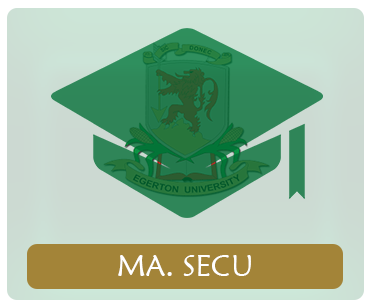Master of Science in Community Studies and Extension
-
UNITS
12
-
DURATION
2 Years
-
FEE
From: $1000/year
About the Program
The Master of Science programme in Community Studies and Extension (COSE) is designed to address the rapid changes affecting individuals, families, communities, and the society. These changes evolve around cultural, economic, technological, political, environmental and human factors at different levels in society. COSE focuses on sustainable development, which proposes a range of complementary policies to enhance active participation of individuals and families at the grass root level in development interventions. M.Sc. Community Studies and Extension is unique and differs from most programmes offering Masters degree in Community development related areas in the following ways:
MSc COSE has the extension component, which lacks in the other degree programmes. The target groups for M.Sc. COSE are the individuals, families and households. This gives it a grassroot approach, which is not emphasized in other programmes.
The practicum component is unique to M.Sc. COSE and gives students an opportunity to critically analyze the approaches, activities and roles of organizations involved in community development. The M.Sc. COSE program is expected to contribute towards development in critical areas of community improvement such as family and youth development, gender and development, entrepreneurship, community resource management, project planning, implementation, monitoring and evaluation.
Program Objectives
The objectives of the Programme are to:
- Build human capacity in academic and critical thinking to address issues related to physical, economic, technical, social, and psychological transformation of the family and community.
- Provide the student with knowledge and skills in identifying, analysing and interpreting issues in community development.
- Equip the student with understanding of the process of identifying, planning, and managing community development projects.
- Enhance the student’s capacity to incorporate information technology in resource allocation, networking and community development programmes.
- Demonstrate an understanding of theory and practice of research in community studies and extension.
Program Learning Outcomes
The graduate will be able to use acquired knowledge and skills and attitudes to:
- Build human capacity in academic and critical thinking.
- Identify, analyse and interpret issues in community development
- Identify and manage community development projects and programmes
- Incorporate information technology in resource allocation and networking
- Carry out Research and Innovation and be able to undertake further studies.
Requirements
The regulations for the admission to the Masters degree Programme as specified in the Egerton University Statute shall apply.
In addition, applicants for the Master of Science degree in Community Studies and Extension shall be required to have at least upper second class honours bachelor’s degree in Agriculture and Human Ecology Extension, Community Development or related qualifications from recognised institutions. In exceptional cases, holders of lower class honour may be admitted if they have at least two years of relevant experience.
How to Apply
- Apply online via the link given below the Program
- In the Registration portal, click apply and fill out your details in the fields
- Pay the Application fee of Kshs. 2,000 through Egerton University Account Number: KCB Bank A/C No. 1101906812
Fee
Fee Structure Annual charges for the programmes will be as follows:
Tuition Fee per Course Unit:
Undergraduate KES. 13,000.00
Administrative Costs Annually:
Undergraduate KES. 43,900.00
The breakdown of the administrative charges is given below
| Item | Frequency | Amount (Kshs) |
|---|---|---|
| Registration | Once | 2000 |
| Examination | Per Academic Year | 10000 |
| Material Development | Per Academic Year | 6000 |
| Library Fees | Per Academic Year | 5000 |
| Supervision Fee | Per Academic Year | 15000 |
| Student Union | Per Academic Year | 400 |
| CUE Charge | Per Academic Year | 1000 |
| Student ID | Once | 500 |
| Caution Money | Once | 4000 |
| Total | First Academic Year | 43900 |
The Annual Administrative fee for the 2nd year is less the Caution money, Student ID Charges ,and Registration fee (total, Kshs. 5,500) amounting to Kshs. 37,400
The fee summary is given below per academic year
| Academic Year | Administrative Fee | Number of Units | Total Tuition) | Total (Kshs) |
|---|---|---|---|---|
| Year 1 | 43900 | 12 units | 12*13000=156000 | 199900 |
| Year 2 | 37400 | 5 units | 5*13000=65000 | 102400 |
Note that the amount might be more depending on the number of units you take each session.
The fee is paid through the following bank account
KCB, Account no. 1101893680
Download a copy of the fee structure below
Program Coordinator

Dr. Susan Kamuru
Lecturer : Applied Community Development Studies (ACDS)Phone # : +254 722 154 111
Email : lol@egerton.ac.ke


